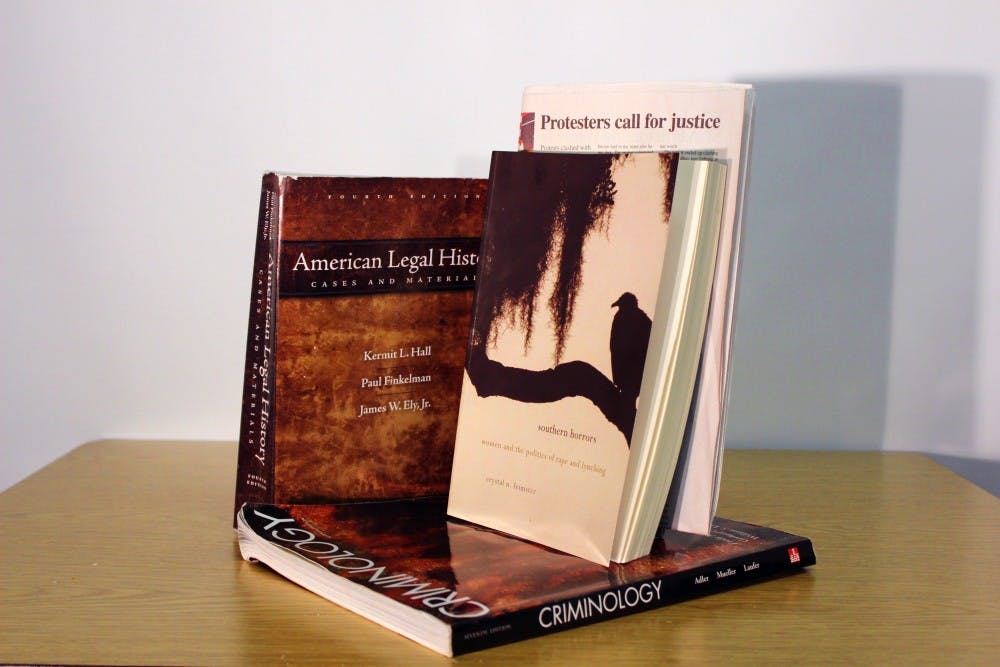About a week ago, I was sitting in my advisor’s office. As a graduating senior, I only need one more class to complete my major. Last year, someone in the Department of Criminology told me a history class called “Racial Violence in Modern America” (HIST–231) would count towards my criminology degree, and I didn’t question it. Violence and crime are related in my head, but during this particular office visit, my advisor calmly told me I was wrong. The class couldn’t count because this class did not have a “substantive crime or criminal justice component.”
I was taken aback. It just sounded wrong. The class had covered rape, murder, brutality and aggravated assault. These are all crimes. I was shocked.
In my silence, she continued, ‘It seems to me that it is a class about lynching and lynching isn’t a crime.’ She argued that lynching was something else.
In the remainder of the meeting and my subsequent emails, she explained further. She had an argument for why she denied this course, along with other Africana Studies courses, from being counted towards the criminology major.
She explained: Lynching is a conflict. And a course on this type of conflict is about the way “social progress occurs in a diverse society.” It's not about a crime. To me, this seemed like rhetoric. This seemed wrong in a more empirical sense
Yes, one could development an argument with this line of rhetoric. But it’s dangerous.
In the first hours of Criminal Justice (CRIM–200), I received a specific definition of crime: “An act committed or omitted in violation of a law forbidding or commanding [the act] for which there are possible penalties.”
Now, some would argue that when lynching was a trend in America, there were no possible penalties. It's true that there wasn't always a specific law against lynching in early American history. But, as far as I know, it was always illegal to murder someone, no matter the context.
The department also says that “acts of terrorism” or war are not included in what’s defined as crime. However, last semester, I was in an in–major class that covered terrorism and one girl in my thesis class wrote her thesis on war. So why can’t we talk about lynching?
To be clear, I’m not saying an entire Ivy League department is racist. I'm not saying that any one person in the department is in the wrong. I’m saying America has a problem talking about race, and that problem has seeped into all aspects of society, even academia.
The hardest part is wrapping my head around the fact that I thought I knew this department. I thought it was liberal. This didn’t feel liberal at all. This felt old. This felt wrong.
Unfortunately, not talking about race is more than uncomfortable. It’s dangerous. The definition of crime has two requirements: a legal statute and a subsequent punishment. Mike Brown. No indictment. Emmett Till. No indictment, even after two people admitted to the kidnapping. Eric Garner. No indictment, even with video evidence. Jesse Washington. No indictment, even with an anti–lynching law on the books in 1916 Texas. Hundreds of others. No indictment. No punishment.
If we discount racial violence one hundred years ago because no action was taken against injustice, if we label it as something else, if we deny that those murders are even included in our definition of “crime,” what stops us from doing it again? In one hundred years, what will we call the deaths of Trayvon, Mike and Tamir? Will we call their deaths “crimes” and “murders,” or will we call them “brutality?”
When we call it anything other than crime, in one hundred years, we give people the opportunity to say, “this is about a social process” and not about individuals' lives. We let them say this was not about crime.
In the end, I felt like I didn’t really understand the major in which I used to be so confident. To finish my major, I've enrolled in Literature and Law (ENGL–066). It's approved by the department. I still believe they should count other classes. But in the end, I'm just a student. I don't control the Department of Criminology.
Whether or not the program changes their definitions or classes in the coming years is entirely up to them. I hope they challenge their own definitions, but something tells me they won’t. For academia to change, the world around academia has to change. People need to start asking questions. So, here's mine: Isn’t it always a crime to kill a man?
If you liked this piece, you should check out our Penn Integration Timeline and Eight Ways to Celebrate Black History Month.

